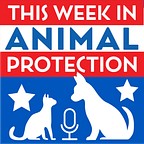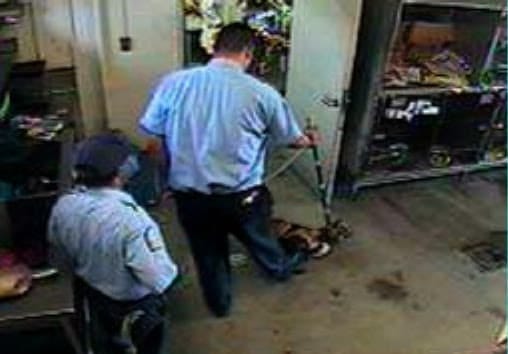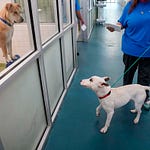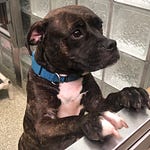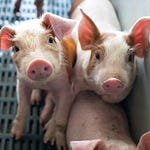Los Angeles County Department of Animal Care and Control officers kick a dog who is being held down with a hard-wired noose around his neck. Although transparency helps keeps abuse in check, the Department is moving to eliminate it and it has the support of organizations like the ASPCA and Best Friends Animal Society to do it.
Some 200 dogs and cats have escaped Kabul, but not everyone is celebrating. For the second time in as many months, an investigation into abusive conditions at the Philadelphia pound, including breaking a dog's jaw, killing him, and covering it up, has led to a recommendation of criminal charges. If the governor signs it, a bill that has passed the California legislature will end businesses that “house hundreds of dogs, mostly greyhounds, for the sole purpose of draining their blood.” The Knight First Amendment Institute has filed a lawsuit against the Department of Health and Human Services for violating the free speech rights of advocates by hiding comments critical of animal research on its social media pages. Utah is one shelter away from eliminating the gas chamber to kill animals. Millions of dogs and cats are at risk of losing their homes as the U.S. Supreme Court has ruled that the CDC does not have the legal authority to issue a nationwide eviction moratorium in response to the pandemic. A new study shows that dogs can tell the difference between accidents and intentional actions by people. The number of communities placing over 95% and as high as 99% of the animals is increasing. And shelters are refusing to fully open to the public, threatening to increase the amount of neglect, abuse, and killing of animals.
These are some of the stories making headlines in animal protection.
About 200 dogs and cats have escaped Kabul. They were flown on a “privately funded chartered plane.” Sadly, some people are complaining that they should have been left behind in favor of people, but that’s a facile comparison. And while I am truly sorry for those left behind, forgoing rescue attempts and letting those animals die wasn't a strategy for saving people. The fault for those in danger who did not make it out does not lie with innocent dogs and cats or those who rallied to save them.
Last month, after staff at the Philadelphia, PA, pound broke a dog’s jaw, killed him, and then lied about it as part of a cover up, the director claimed “they are now reviewing their policies with staff to make sure this never happens again.” One month after promising to improve, a state inspection uncovered extensive filth and feces, as well as dogs not being examined or treated. It is the second time in as many months that an investigation into abusive conditions at the Philadelphia pound has led to a recommendation of “animal cruelty charges.”
A bill in California to modernize an archaic system of providing blood for dogs who need transfusions has overwhelmingly passed the legislature. Currently, California is the only state that relies on businesses that “house hundreds of dogs, mostly greyhounds, for the sole purpose of draining their blood.” But "The days of captive ‘blood slave’ donor dogs may soon be over... if the governor signs a hard-fought bill that’s headed to his desk.”
The Knight First Amendment Institute has filed a lawsuit against the Department of Health and Human Services for violating the free speech rights of advocates by hiding comments critical of animal research on its social media pages. Animals have no voice of their own and need others to speak for them. Deleting/hiding critical comments effectively silences them. This is true regardless of whether the animals are being abused or killed in a laboratory, factory farm, slaughterhouse, or animal “shelter.”
Earlier this summer, the last remaining gas chamber in Ohio was dismantled and the state became gas chamber-free. In Utah, with the recent announcement that North Utah Valley Animal Shelter “will no longer use gas chamber euthanasia on animals at its facility,” the state is one shelter away from doing the same.
The U.S. Supreme Court has ruled that the CDC does not have the legal authority to issue a nationwide eviction moratorium in response to the pandemic. The ruling could put millions of dogs and cats who live in a home or apartment that is not current on their rent or mortgage at risk of losing those homes. In response, The No Kill Advocacy Center has offered a roadmap for shelters to prevent killing.
Ever bump into your dog or step on a tail because of inattentiveness? Your dog knows it was an accident. A new study shows that dogs can tell the difference between accidents and intentional actions by people. They are so good at reading people’s mental states, they can even tell whether people are happy or sad just by looking at the top half of their faces.
As more people turn to rescue and adoption and more shelters embrace progressive policies, the number of communities placing over 95% and as high as 99% of the animals is increasing:
East Monmouth County, NJ, reported a 99% placement rate for dogs, 97% for cats, and 98% for other animals. For dogs, it is part of the most exclusive club in the movement: those placing at least 99%.
Camden County, NJ, reported a 95% placement rate for cats and 94% for dogs, the first year it has done so.
Muncie, IN, reported a 98% placement rate for dogs and 96% for cats.
And Wayne, NJ, reported a 96% placement rate for dogs, 97% for cats, and 100% for other animals.
These shelters and the data nationally prove that animals are not dying in pounds because there are too many, because there are too few homes, or because people don’t want the animals. They are dying because people in those pounds are killing them. Replace those people, implement the No Kill Equation, and we can be a No Kill nation today.
We celebrated the birthday of the late Henry Bergh, the 19th Century animal advocate who incorporated the nation’s first SPCA and helped launch the humane movement in North America. Although he is not a very well known figure, we and the animals owe him a great deal. Every humane society that stands up for animals; every animal protection group that gives voice to the voiceless; and the millions of animals who have been saved thanks to the efforts of activists and advocates, are a living legacy to his life. Bergh was one of the first Americans to begin weaving the ideals of animal protection into our jurisprudence, the American psyche, and the fabric of American life.
And, finally, shelters are killing animals because they refuse to open fully to the public. Some, like Los Angeles County, have announced their intent to make it permanent. This threatens to erase the tremendous gains made by the No Kill movement over the last decade to force greater public access, as well as to force better and more sensible adoption and reclaim hours, all of which have been key to reducing shelter killing nationwide.
But there’s another reason why closing doors to the public is so dangerous for animals: public scrutiny keeps neglect and abuse in check. Rescuers, potential adopters, volunteers, and other members of the public are the eyes, ears, and heart of the community. If they are not allowed to visit the facility unannounced, animals will suffer in silence. That’s not conjecture; it’s history.
Under current Los Angeles County management, animals have been starved to death; cats have contracted fatal diseases because they were not given an examination, treatment, or vaccinations on intake; animals have been left with torn ears and gouged eyes without rehabilitative care; and animals have cannibalized one another because they were left without food. There’s more, including staff physically assaulting animals and staff simply clocking-in and then going home, getting paid for sleeping on the job, while animals are left in need. And yet groups like Best Friends Animal Society and the ASPCA are defending the change in policy and encouraging other communities to likewise limit unannounced public access to the pound.

